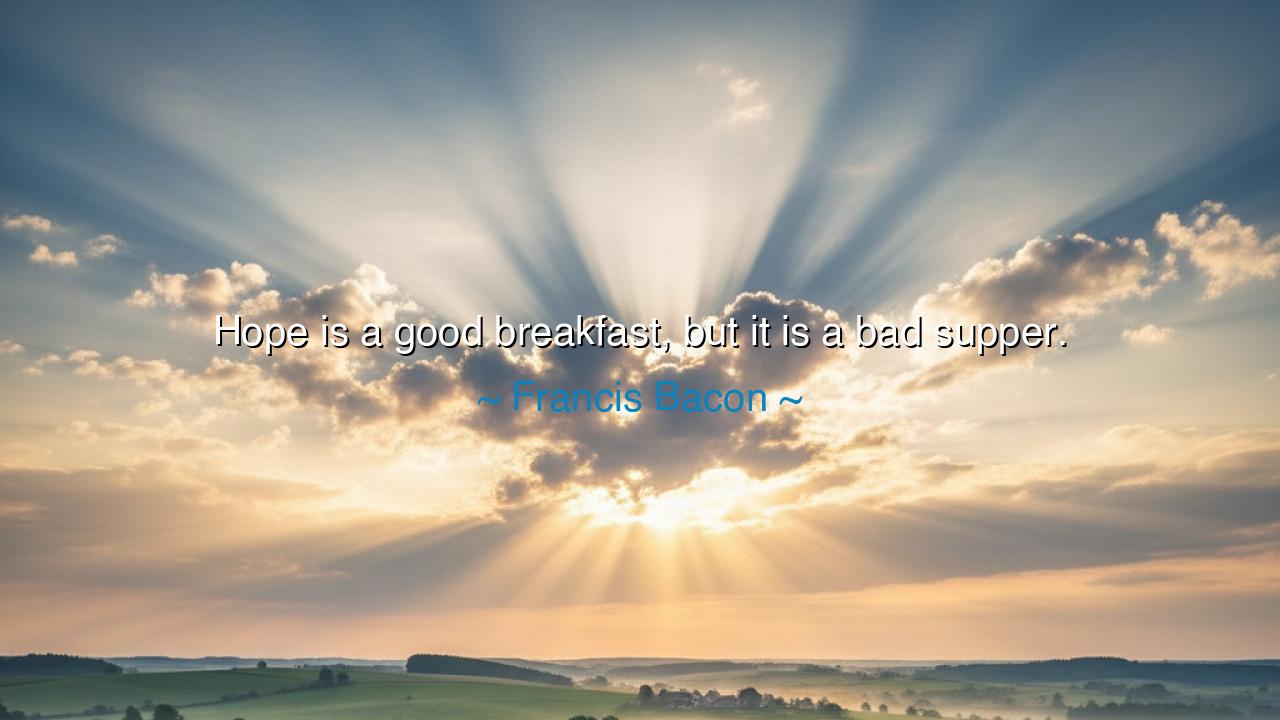
Hope is a good breakfast, but it is a bad supper.






In the golden age of reason, when philosophers sought to unite the light of thought with the warmth of the human heart, Francis Bacon, the father of modern empiricism, uttered a truth both subtle and eternal: “Hope is a good breakfast, but it is a bad supper.” At first glance, these words seem simple — almost domestic — but within them lies an ocean of wisdom. For Bacon, who stood at the dawn of science yet understood the frailty of the soul, hope was both nourishment and illusion, both the dawn of courage and the dusk of regret. He warns us that hope, though sweet and sustaining at the day’s beginning, must not be the meal with which we end it.
To take hope as one’s breakfast is to begin life — or any endeavor — with vision, optimism, and faith in possibility. Morning is the hour of beginnings, and hope is the flame that kindles the will to act. The farmer sows his seed in hope of harvest, the sailor sets forth in hope of fair winds, the scholar opens his book in hope of discovery. It is hope that pushes the weary to rise and begin anew. Bacon knew that without this first nourishment, the spirit withers before the body has even moved. Hope in the morning is strength. It fills the heart with courage, for the day is long and the future is unseen, and man must believe in something beyond his sight to endure.
But Bacon, wise in the cycles of the world, saw the shadow that follows hope if left untempered. For if hope becomes supper, if at day’s end it is all that one has, then it is no longer food but famine. To live on hope alone is to dine on dreams, to mistake wishing for doing. The man who ends his day still hoping, but never acting, has fed his soul on illusion. Hope is the spark; it is not the fire. It begins the labor, but it must not replace the labor itself. To feast only on hope at night is to go hungry in the realm of deeds.
This truth was lived out in the story of the great explorer Christopher Columbus, who set sail into the unknown with the hope of finding a new world. His hope was a noble breakfast — it gave him the courage to brave the endless horizon when others feared the edge of the world. But had he relied only on hope, and not on skill, planning, and relentless perseverance, his ship would have vanished into the mist. Columbus’s triumph came not because he hoped for land, but because he labored toward it. So it is with every human soul: hope must open the morning, but work must close the day.
The ancients, too, understood this balance. The Stoics taught that hope and fear are two sides of the same coin — both distract from the present moment. To hope too long without acting is to surrender to fantasy, just as to fear too deeply is to surrender to despair. Bacon’s wisdom stands among theirs, teaching that man must rise with hope in his heart, but sleep with action in his hands. For the one who acts transforms hope into harvest, while the one who merely dreams turns hope into hunger.
And yet, Bacon’s words are not meant to extinguish hope, but to discipline it. He does not condemn the dreamer; he calls him to maturity. Morning hope is youthful — bright, eager, innocent. Evening hope, unfulfilled, is weary, fragile, and hollow. To live well, one must let hope ripen into achievement, must transform longing into reality before the light fades. The wise do not sit beneath the stars wishing for bread; they sow their fields while the sun still burns.
So, my child of thought and action, take this teaching to heart: begin every day with hope, but end it with accomplishment. Let your mornings be filled with vision, but let your nights be crowned with work completed, no matter how small. Do not despise hope — it is divine fire — but do not worship it either. Feed upon it when the day begins, and then go forth to build, to strive, to turn that vision into truth.
For in the end, as Bacon teaches, hope is a good breakfast — it awakens the soul to what might be — but it is a bad supper if it is all that remains. To live rightly is to let hope give birth to action, and to let action give birth to fulfillment. Then, when the evening comes, you may sit in peace — not still hoping, but knowing that you have turned hope into light.






AAdministratorAdministrator
Welcome, honored guests. Please leave a comment, we will respond soon